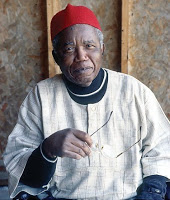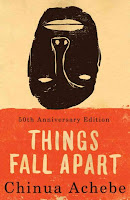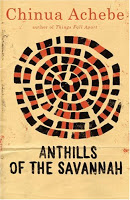
Nigerian novelist Chinua Achebe has passed away at the age of 82. As I read his obituaries I see that he is described as “a giant”, “one of the great literary voices of all time” and “a colossus of African writing”.
 In 1958 his first novel, Things Fall Apart (M) explores the clash between traditional African culture and colonialism from the perspective of, and with the voice of an African. Hardworking Okonkwo builds his fortune and becomes a leader in his village. A series of tragic events leads to his exile, and when he returns to his village, he finds that the arrival of the white men has changed his village’s traditional culture and he is unable to adapt. Things Fall Apart has been a staple in African schools for decades.
In 1958 his first novel, Things Fall Apart (M) explores the clash between traditional African culture and colonialism from the perspective of, and with the voice of an African. Hardworking Okonkwo builds his fortune and becomes a leader in his village. A series of tragic events leads to his exile, and when he returns to his village, he finds that the arrival of the white men has changed his village’s traditional culture and he is unable to adapt. Things Fall Apart has been a staple in African schools for decades.
Achebe published five novels in his lifetime and had a long academic career with numerous essays, short stories, books of poetry and literary criticism. His writing focused largely on European colonialism and spoke with the voice of the colonized. His writing style was heavily influenced by his own oral traditions and traditional storytelling and folktales are incorporated into his works. I read Anthills of the Savannah (M) many years ago and can still recall its power. A west African country, a version of Nigeria, is in the aftermath of a military coup which unseats a dictator. The new leader finds himself in a weakened position and becomes increasingly tyrannical in an effort to protect his own position.
I read Anthills of the Savannah (M) many years ago and can still recall its power. A west African country, a version of Nigeria, is in the aftermath of a military coup which unseats a dictator. The new leader finds himself in a weakened position and becomes increasingly tyrannical in an effort to protect his own position. Achebe’s last published work was There Was a County: a personal history of Biafra (M) “The defining experience of Chinua Achebe’s life was the Nigerian civil war, also known as the Biafran War, of 1967–1970. The conflict was infamous for its savage impact on the Biafran people, Chinua Achebe’s people, many of whom were starved to death after the Nigerian government blockaded their borders. By then, Chinua Achebe was already a world-renowned novelist, with a young family to protect. He took the Biafran side in the conflict and served his government as a roving cultural ambassador, from which vantage he absorbed the war’s full horror. Immediately after, Achebe took refuge in an academic post in the United States, and for more than forty years he has maintained a considered silence on the events of those terrible years, addressing them only obliquely through his poetry. Now, decades in the making, comes a towering reckoning with one of modern Africa’s most fateful events, from a writer whose words and courage have left an enduring stamp on world literature.” publisher
Source: http://www.thereader.ca/2013/03/in-memoriam-chinua-achebe.html



